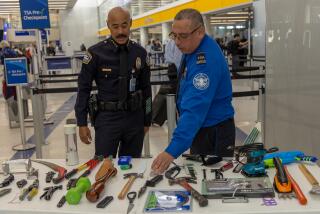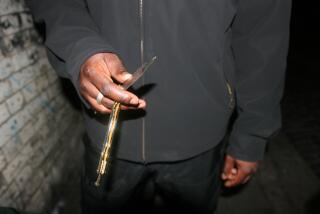TSA to continue prohibiting carry-on pocket knives on planes
- Share via
Under pressure from lawmakers and flight attendants, the Transportation Security Administration said it would indefinitely prohibit passengers from carrying small pocket knives on planes — a ban that began after the Sept. 11 terrorist attacks.
The decision is a dramatic reversal for TSA chief John Pistole. Two months ago he decided to lift the ban, saying the move would enable airport security officers to focus on bigger threats, such as explosives.
Just days before the TSA planned to lift the ban April 25, Pistole said he was temporarily putting off the policy change to consider the comments and concerns of a security panel made up of pilots, flight attendants and other airline workers. However, as recently as last week, Pistole defended lifting the ban during a speech at George Washington University.
But TSA officials now say the agency has no plans to lift the knife ban.
“After extensive engagement with the Aviation Security Advisory Committee, law enforcement officials, passenger advocates and other important stakeholders, TSA will continue to enforce the current prohibited items list,” the agency said in a statement.
Opponents of the ban, including flight attendants, welcomed Pistole’s announcement, calling it a victory for airline safety.
“Passenger safety is every flight attendant’s top priority and we are pleased to learn that TSA agrees with our approach,” said Laura Glading, president of the Assn. of Professional Flight Attendants, the union representing 16,000 flight attendants for American Airlines.
The flight attendants’ union collected signatures from 140 members of Congress who oppose lifting the knife ban. Union representatives say they believe Pistole relented under pressure from key members of Congress, including Reps. Edward J. Markey (D-Mass) and Michael Grimm (R-N.Y.).
The decision to keep the ban in place also means that the TSA will continue to prohibit passengers from carrying golf clubs, novelty baseball bats, hockey sticks and pool cues on planes. Pistole had considered lifting the ban on such sporting equipment as well.
The plan to lift the ban generated harsh criticism and protests from lawmakers and flight attendants who pointed out that the terrorists who hijacked the planes on Sept. 11, 2001, were armed with small blades, among other weapons.
The TSA plan would have allowed folding knives with blades less than 2.36 inches long and half an inch wide. There were no plans to lift the ban on box cutters and other blades.
Rep. Janice Hahn (D-San Pedro), who called plans to lift the ban “irresponsible and reckless,” said the policy would have put passengers, flight attendants and pilots in danger.
“I appreciate that the TSA listened to the American passengers, and particularly our flight attendants who felt uniquely vulnerable and have spoken out overwhelmingly in opposition to the knives on planes plan,” she said.
The TSA also received letters of protest from the families of flight attendants killed on 9/11.
TSA officials have argued that small knives are not a serious threat to a plane since airlines installed locking reinforced cockpit doors. Further, the TSA has increased the number of armed marshals in the air, among other security measures.
Pistole also argued that small knives are allowed by many foreign airlines and lifting the ban would bring U.S. policy in line with other countries. TSA officials have argued that confiscating small knives — about 1,400 pocket knives a month at Los Angeles International Airport alone — takes time and effort away from looking for more serious threats.
The move to allow small pocket knives would not have been without precedent.
The TSA has revised the list of banned items on commercial planes several times in the last decade.
For example, common lighters were removed from the banned list in 2007, but torch lighters that create super-hot, needle-like flames are still prohibited. A book of matches is allowed into the cabin, but not the kind that a user can strike on any surface.
Knitting needles are allowed and so are screwdrivers under 7 inches long, but not ice picks.
Snow globes were pulled off the prohibited list a few months ago, but only if the globe has less than 3.4 ounces of liquid inside. That’s about the size of a tennis ball.
More to Read
Inside the business of entertainment
The Wide Shot brings you news, analysis and insights on everything from streaming wars to production — and what it all means for the future.
You may occasionally receive promotional content from the Los Angeles Times.










